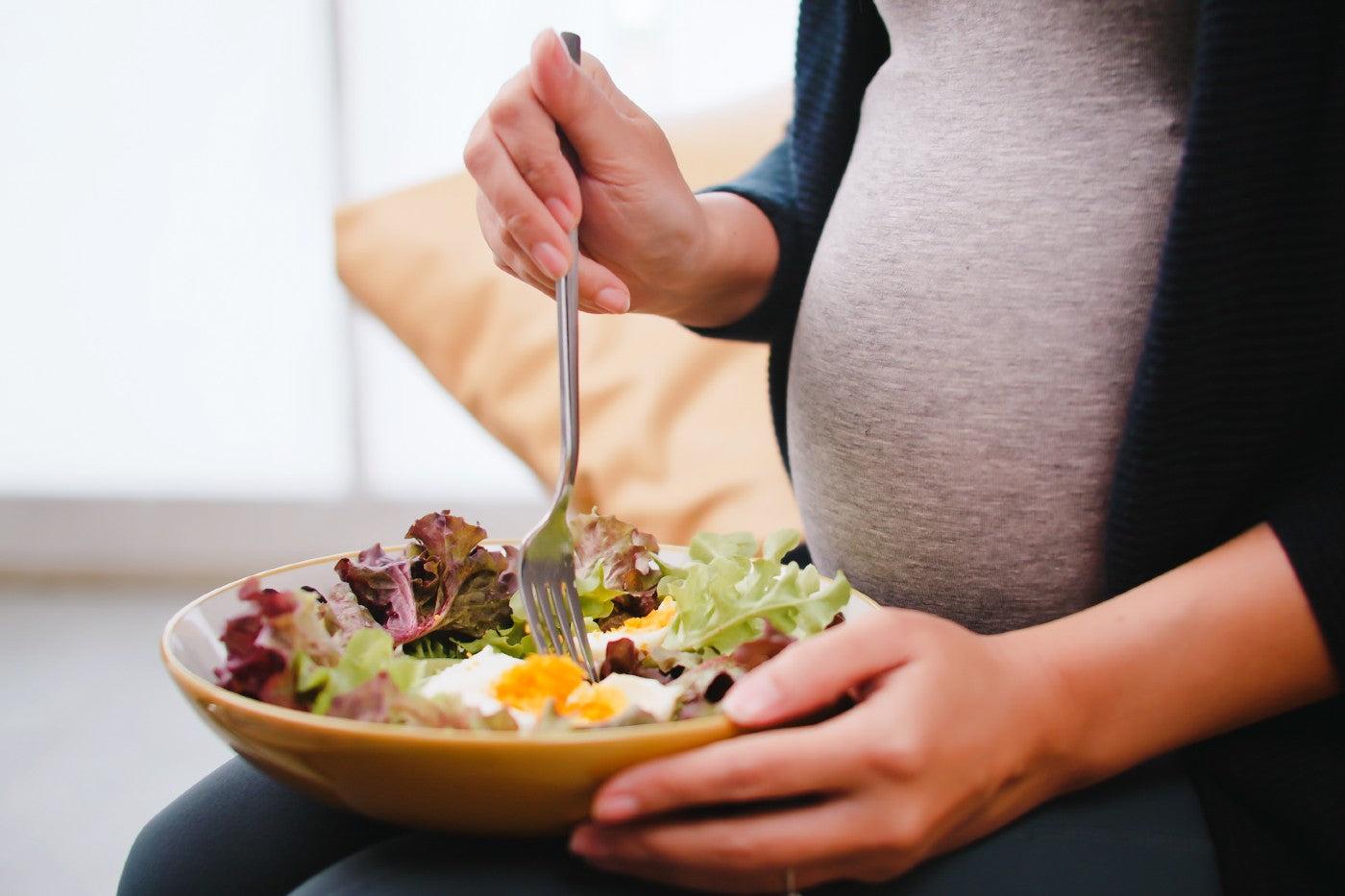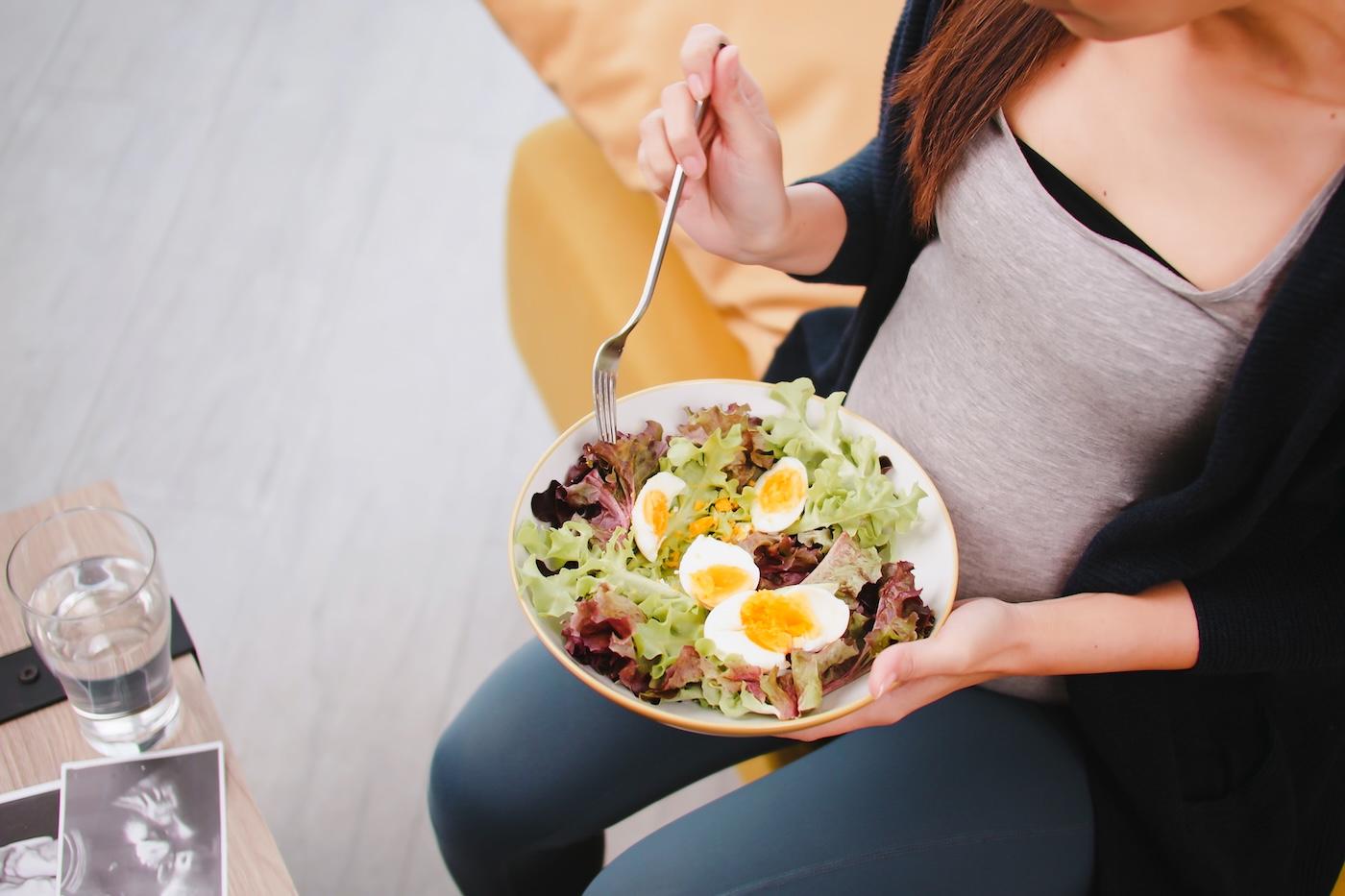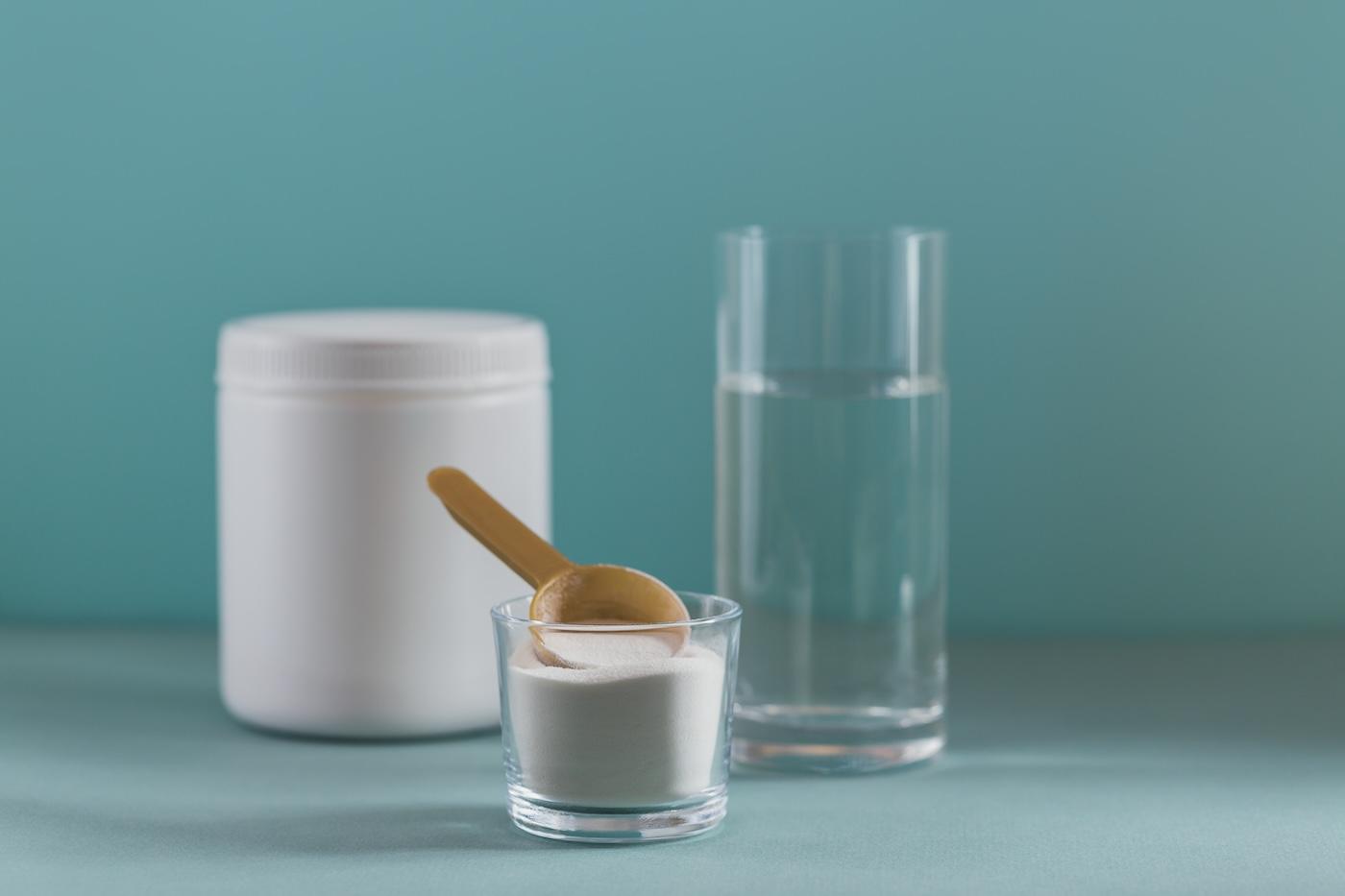PREGNANCY
8 Must-Have Nutrients for Vegetarian Pregnancies
It’s totally possible to get everything you and Baby need…without eating meat (or dairy).

Written by
Gabrielle McPherson, MS, RDN, LDN

Once that second line appears on your pregnancy test, you might start thinking not just about nurseries and baby names…but also about nutrition! After all, you are “eating for two” now. You’re probably beginning to wonder whether you’ll have to adjust your diet to meet your little bundle’s needs—especially if you’re vegetarian or vegan.
It’s true, there are lots of benefits to going vegetarian (for both you and Baby). Plant-based diets are linked to lower chances of heart disease, diabetes, high blood pressure, and more. That’s because vegetarian diets have less cholesterol and saturated fats, and more significant amounts of phytonutrients, antioxidants, and fiber. The drawback is that vegetarian diets are prone to low intakes of critical micronutrients both Parent and Baby need, including calcium, iodine, omega 3 fats, zinc, vitamin D, vitamin B 12, and iron, which is why nutrient deficiencies tend to be common in vegetarians and vegans.
Fortunately, it’s totally possible to get everything you and Baby need…without eating meat (or dairy). Read on to learn how to eat for a healthy vegetarian pregnancy.
Is being vegetarian safe for pregnancy?
Yes! Vegetarianism is safe during pregnancy—but you may need to work harder to get certain nutrients. The Academy of Nutrition and Dietetics states that vegetarian and vegan diets can be “appropriate for all stages of the life cycle, including pregnancy.” But they add that these diets should be healthful, nutritionally adequate, and well-planned. Pregnancy is a time of rapid growth and development, increasing your body’s demand for good nutrition.
Your baby is being made from scratch inside of your womb. So, your body needs the proper tools to grow those tiny fingernails, toes, eyes, ears, and all the other sweet little parts you’ll get to kiss soon. You can give your baby a healthy start as a vegetarian by making sure you’re eating a wide variety of foods containing essential nutrients.
Types of Vegetarian Diets
A quick word before we offer suggestions: The label “vegetarian” is not one-size-fits all! There are a few different ways you might approach a plant-based or plant-centric diet—which is why you may see dairy, eggs, or even some fish in our recommendations.
Different types of vegetarian pregnancies include:
- Ovo-vegetarian diets avoid meat, fish, poultry, and dairy but include eggs.
- Lacto-ovo-vegetarian diets avoid meat, fish, and poultry but include dairy and eggs.
- Lacto-vegetarian diets avoid meat, fish, poultry, eggs, and foods that contain them.
- Pescatarian diets avoid meat, poultry, dairy, and eggs but include fish.
- Vegan diets avoid meat, fish, poultry, fish, eggs, and dairy.
Key Nutrients for a Vegetarian Pregnancy
Follow this simple guide to eat your way to a healthy pregnancy as a vegetarian parent-to-be. No matter what type of vegetarian lifestyle you follow, food in each nutrient category can fit into your eating plan (our list includes a little bit of fish for those whose vegetarian lifestyle allows it, but plenty of other options for those who don’t eat it!).
Calcium
Calcium is a pregnancy must-have mineral for nourishing and building your sweet pea’s strong teeth and bones.
How Much You Need: Folks 18 and under need 1300 milligrams (mg) a day, and those 19 and up need 1,000 mg a day.
High-Calcium Foods
- 3 ounces of sardines, canned: 325 mg
- 1 cup of collard greens, cooked: 266 mg
- 4 ounces of tofu: 205 mg
- 6 ounces of Greek yogurt: 200 mg
- 1 cup soybeans, cooked: 175 mg
Iodine
Iodine helps enhance your baby’s brain, growth, speech, and hearing. What’s more, low iodine status during pregnancy may negatively impact a baby’s developing brain, according to some research.
How Much You Need: 220 micrograms (mcg)
High-Iodine Foods
- 3 ounces of cod, baked: 158 mcg
- 5 grams of seaweed, dried: 116 mcg
- 1/4 teaspoon of iodized salt: 76 mcg
- 1 cup of enriched pasta boiled with iodized salt: 35 mcg
- 1 hardboiled egg: 26 mcg
Omega-3 Fats
Omega-3s are unsaturated fats that support your baby’s heart, brain, and eye health. Your body can’t make omega-3s on its own, so it’s super important that you get them through diet or supplements.
How Much You Need: 1.4 grams (g)
High-Omega-3 Foods:
- 1 Tablespoon of flaxseed oil: 7.3 g
- 2 Tablespoons chia seeds: 5 g
- 3 Tablespoons of hemp seeds: 3 g
- 14 walnuts: 2.6 g
- 5 ounces of salmon: 2.2 g
Zinc
Zinc helps boost your baby’s immune system and plays a role in cell growth and brain development. To boot, one study found zinc supplementation in pregnancy slightly lowered premature births!
How Much You Need: 11.4 mg
High-Zinc Foods:
- 3 tablespoons of hemp seeds: 3 mg
- 1 cup of lentils, cooked: 2.5 mg
- 1 cup of quinoa, cooked: 2 mg
- 1 ounce of cashews, raw: 1.6 mg
- 1 slice of cheddar cheese: 1 mg
Protein
Protein is a macronutrient (aka a significant nutrient) made up of basic parts called amino acids, which your body needs to build Baby’s cells, tissues, and organs during development. For pregnant folks, protein also helps with breast and uterine tissue growth to support the baby in utero.
How Much You Need: Research indicates that pregnant people should get 0.88 to 1.1 g per kilogram of body weight, which is 70 to 88 grams of protein for a 175-pound person.
High-Protein Foods
- 5 ounces of seitan: 25 g
- 1 cup of black beans: 15 g
- 1 cup of edamame: 14 g
- 1 cup of green peas: 9 g
- 1/2 ounce of nutritional yeast: 8 g
Vitamin D
Vitamin D is a critical nutrient for your baby’s bones, teeth, skin, and vision. And a recent review suggests low vitamin D intakes during pregnancy may be linked to a greater risk for autism and attention deficit disorder. (Related: Read up on why babies need vitamin D)
How Much You Need: 600 international units (IU)
High-Vitamin-D Foods:
- 5 ounces of sardines, canned: 214 IU
- 1 cup soy milk, fortified: 239 IU
- 1 cup of cow’s milk: 120 IU
- 1/2 cup of oatmeal: 120 IU
- 1 egg yolk: 37 IU
Vitamin B-12
Vitamin B-12 can be tough to get enough of for vegetarians because it’s primarily found in animal products like red meat and eggs. Growing babies in the womb depend on B-12 for vision, healthy formation of red blood cells, and the brain and nervous system.
How Much You Need: 2.4 mcg
High-Vitamin B-12 Foods:
- 1 cup whole grain cereal, dry and fortified: 5mcg
- 1 Tablespoon of nutritional yeast: 2.4 mcg
- 1 cup cow’s milk: 1.2 mcg
- 1 cup of low-fat yogurt: 1.1 mcg
- 1 egg, hardboiled: 0.6mcg
Iron
Iron deficiencies are surprisingly common during pregnancy—among vegetarians and nonvegetarians alike! If you’re short on this mineral, it’s important to find ways to get it on your plate. Iron supports the production of hemoglobin, the body’s primary oxygen carrier that transports nutrients to the baby via the blood.
How Much You Need: 27 mg
High Iron Foods:
- 1 cup coconut milk, canned: 7.5mg
- 1 cup lentils, cooked: 7 mg
- 1/2 cup sunflower seeds: 3.5 mg
- 1 cup spelt: 3.2 mg
- 8 ounces of prune juice: 2.9mg
Vegetarian Pregnancy Eating Tips
Healthy pregnancies don’t require meat (or dairy!), but in addition to incorporating the above nutrients, follow these tips to make sure you and Baby are getting what you need:
- Take prenatal vitamins as directed by your medical provider.
- Track your eating in your phone to get a sense of your dietary patterns and any deficiencies.
- Consult with a prenatal dietitian nutritionist for more personalized advice.
- Avoid eating raw or undercooked foods, alcohol, and the artificial sweetener, saccharin to be safe.
- Limit caffeine to no more than 200mg daily, which is about 12 ounces of coffee.
More Advice for a Healthy Pregnancy:
- Is Eating Fish Safe During Pregnancy?
- Straight Talk on Foods to Avoid in Pregnancy
- Healthy Smoothie Add-Ins for Pregnancy
- How to Ease Morning Sickness
- Natural Ways to Alleviate Heartburn
***
REFERENCES
- National Library of Medicine: Vegetarian Diet
- The Effects of Vegetarian and Vegan Diet during Pregnancy on the Health of Mothers and Offspring, Nutrients, March 2019
- Position of the Academy of Nutrition and Dietetics: Vegetarian Diets, Journal of the Academy of Nutrition and Dietetics, 2016
- Thyroid Disease in Pregnancy: New Insights in Diagnosis and Clinical Management, National Review of Endocrinology, October 2017
- Iodine Deficiency and Brain Development in the First Half of Pregnancy, Public Health Nutrition, December 2007
- Omega-3 Fatty Acids and Pregnancy, Review of Obstetrics & Gynecology, Fall 2010
- Zinc supplementation for Improving Pregnancy and Infant Outcome, The Cochrane Database of Systematic Reviews, February 2015
- Protein and Amino Acid Requirements During Pregnancy, Advances in Nutrition, July 2016
- Vitamin D Supplementation During Pregnancy: An Overview, Current Opinion in Obstetrics & Gynecology, October 2020
- Johns Hopkins All Children’s Hospital Health Library: Are Artificial Sweeteners OK During Pregnancy?
Disclaimer: The information on our site is NOT medical advice for any specific person or condition. It is only meant as general information. If you have any medical questions and concerns about your child or yourself, please contact your health provider.
SHARE THIS ARTICLE
MOST LOVED
Sleepytime Sidekicks
More on Pregnancy
About Gabrielle McPherson, MS, RDN, LDN
Gabrielle McPherson, MS, RDN, LDN is registered dietitian in Missouri who specializes in community and pediatric nutrition. Gaby is passionate about encouraging families to eat well in simple, practical ways that are realistic...and delicious! When not working, Gaby loves cooking, baking, and making messes and memories with her sous-chef/preschooler Charlotte.












